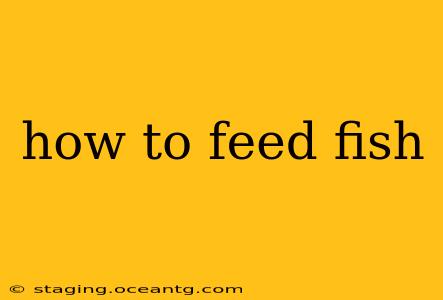Keeping fish is a rewarding hobby, but responsible fish ownership hinges on proper feeding. Overfeeding is a common mistake leading to water quality issues and fish health problems. This guide provides a comprehensive approach to feeding your finned friends, ensuring their well-being and the health of your aquarium.
What Kind of Fish Food Should I Use?
The type of fish food you use depends entirely on the species of fish you have. Different fish have different dietary needs. For example, carnivorous fish like betta fish require a diet rich in protein, while herbivorous fish like goldfish benefit from a diet containing algae and plant matter. Avoid generic "fish flakes" unless they are specifically suited to your fish's needs.
Consider these factors:
- Species-specific diets: Research the dietary requirements of your specific fish species. Many brands offer specialized food for particular types of fish.
- Food type: Flakes, pellets, frozen foods (bloodworms, brine shrimp), and live foods (daphnia) all offer different nutritional profiles. A varied diet is usually best.
- Quality: Choose high-quality food from reputable brands, avoiding those with low-quality ingredients or fillers. Look for foods that are clearly labeled with their nutritional content.
How Much Should I Feed My Fish?
Overfeeding is a significant problem in aquarium keeping. Always follow the "less is more" approach. A good rule of thumb is to feed only what your fish can consume within 2-3 minutes. Any uneaten food should be removed immediately to prevent water quality deterioration.
Adjusting Feeding Amounts:
- Fish size: Smaller fish need smaller portions more frequently. Larger fish can eat less frequently, but in larger quantities.
- Fish activity level: More active fish will require slightly more food.
- Water temperature: Warmer water speeds up metabolism; fish in warmer water may need slightly more food.
How Often Should I Feed My Fish?
The frequency of feeding depends on the fish species and their size. Generally, most fish should be fed once or twice a day. However, some fish can benefit from fasting once or twice a week to improve digestion.
Adjusting Feeding Frequency:
- Young fish: Young fish require more frequent feedings to support their rapid growth.
- Adult fish: Adult fish require less frequent feedings as their growth slows down.
- Fasting: Periodic fasting can help maintain good health and prevent overfeeding.
What are the Signs of Overfeeding?
Overfeeding is detrimental to your fish and your aquarium's health. Look out for these signs:
- Uneaten food: Leftover food accumulating on the bottom of the tank.
- Cloudy water: Uneaten food decomposing, causing bacterial blooms.
- Increased algae growth: Excess nutrients from uneaten food fuel algae growth.
- Fish becoming lethargic: Overfed fish can become bloated and sluggish.
What Happens if I Overfeed My Fish?
Overfeeding leads to several problems:
- Water quality deterioration: Uneaten food decays, producing harmful ammonia and nitrite levels, potentially causing illness and death.
- Fish health problems: Overeating can cause digestive issues, bloating, and other health complications.
- Increased algae growth: Excessive nutrients from uneaten food contribute to excessive algae growth.
How do I know if my fish are getting enough food?
Observe your fish closely. Healthy fish are active, have vibrant colors, and show a healthy appetite. If your fish are lethargic or their colors are dull, it could indicate either underfeeding or another underlying problem. Monitor their activity level and adjust feeding amounts as needed.
What if my fish refuses to eat?
Several factors can influence a fish's appetite, including stress, illness, or a change in environment. If your fish refuses to eat for a prolonged period, observe for any other symptoms of illness and consult a veterinarian specializing in aquatic animals. Avoid abrupt changes in food or environment.
This guide provides a general overview of fish feeding practices. Always research the specific requirements of your fish species to ensure their health and well-being. Remember, responsible fish keeping starts with understanding and meeting their individual needs.
